#I guess I should apologize for these treatises in advance
Text
Before we start, I'd like to say that the below combination....speaks to me, on a personal level.

WHEW.
12x02: Mamma Mia
This episode *eyeroll* - there were like...five? good things about it.
(Mary Winchester as the OG John Winchester Apologist not being one of them.)

wrong.
Anyway, here is the only good stuff from 12x02.
1.
INTERIOR: SAM AND TONI ARE IN BED RELAXING AND HOLDING GLASSES OF WINE.
For the life of me this is the ONLY DECENT THING I CAN FIND FOR this scene and I do not understand how that’s possible. You can’t even see her face. Damn.

There are so many good shots in this!!!! Someone make me a better .gif. Maybe cut Sam out of it?
Update: semi-acceptable follow-up image:

Sexual escapades are actually a continuing theme in the torture:
TONI
Good morning, Sam. Let's start again, shall we? Take our time. I've cleared my calendar. I would like names and locations of every Hunter... the passcodes to each and every Men of Letters database held in the bunker, and then – oh, yes – let's do discuss your relationship with the demon Ruby.
** Can’t find the actual reaction to this, so hey let’s play Sam reacts but wrong episodes ONLY**





SEXUAL ESCAPADE THEME RECURS HERE:
[INTERIOR: THE CELLAR, TONI LOOKS OVER HER TORTURE TOOLS AND PICKS UP BRASS KNUCKLES. SHE WALKS OVER AND SLUGS DEAN.]
TONI: Passcodes, Sam. Not yet?
[TONI LOOKS OVER AT DEAN WHO’S CHAINED WITH HIS HANDS OVER HIS HEAD.]
TONI: Anything to add?
DEAN: No. No, I just came by for some tea and a beating.
[TONI: PUTS DOWN THE BRASS KNUCKLES AND PICKS UP A CUP OF TEA.]
TONI: Really? See, I thought you might be on for a little chat about your mate, Benjamin Lafitte. I'm sorry. You called him Benny. You know, the vampire whom you released from Purgatory and...befriended.
***she sips her fucking tea after she says “befriended” suggestively. SHE. SIPS. HER. TEA. This is not a drill***
I see. Well... the English are nothing if not patient.

BONUS - actual footage of Lady Motherfucking Antonia Bevell deciphering the past 11 seasons of subtext in respect to Dean’s sexuality:

Bi!Dean confirmed.

QUEEN DID NOT COME TO PLAY.
2.
Dean’s spiral at the bunker
CASTIEL: Okay, I understand. I'll call you in the morning.
[WHILE TALKING, DEAN RISES AND STARTS PACING.]
DEAN: Cass, hey. So, here's the thing. It's been kind of weird here with, you know, Mom being back. It's like we don't know how to act around each other, so we just kind of make this small talk and act normal, but it's – it's so not normal.
CASTIEL: Um, I'm – I'm not sure. What – what has she said to you?
DEAN: Well, nothing. That – that – that's the whole point.
CASTIEL: Okay, what have you said to her?
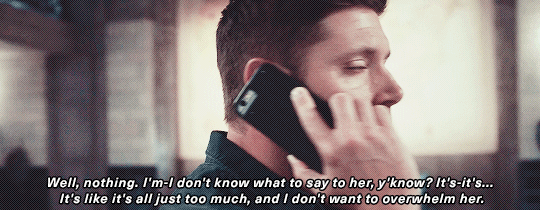
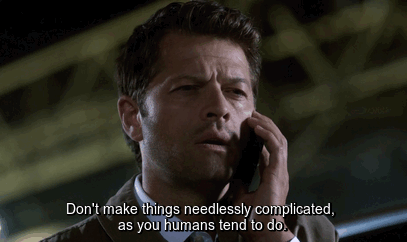
CASTIEL HANGS UP.
DEAN: Yeah. Great. That's helpful. Thanks.
***Dean is so OPEN with Cas on this call. You can tell this is a deeper, different dynamic and it really shows how close they’ve gotten after that heart wrenching Season 11 finale. these NEWLYWEDS. they are in a RELATIONSHIP. And Cas’s terrible attempt at helping also shows how new and fresh it is, how they’re working through how to “be” this new way together, Dean still working on how to express feelings without spiraling, Cas clumsily trying to support him. I AM GOOOOOOO.
This is a fucking warm blanket.

Also confirmed by the subsequent scene, because otherwise WHY EVEN HAVE THIS DIALOGUE in the follow-up call:
DEAN
Hey, Cass, what do you got?
[EXTERIOR: DAY, CASTIEL IS STANDING SLIGHTLY BEHIND A VERY LEAFY TREE.]
CASTIEL
I think I may have found Sam's location. It's a farm. It appears empty, but it was rented two weeks ago to a woman with an English accent.
[DURING THE CONVERSATION THE SCENE SWITCHES BETWEEN THE BUNKER AND THE EXTERIOR OF THE FARMHOUSE.]
DEAN
Did you have a look inside?
CASTIEL
No No, it's – it's powerfully warded.

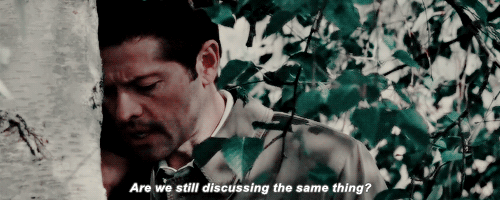
***Cas asks because he’s not sure if Dean is trying to talk about his feelings again or if it’s still about the case, because this is THAT NEW (and he probably had an ENTIRE headcase moment about his prior horrific attempt to “help” so he’s worked up all sorts of tidbits of advice for next time) *** <- can someone ficlet this little plot hole? I need it in my life.
THAT IS THE ONLY REASON TO HAVE THIS HERE. THERE IS NO OTHER REASON.
BONUS:
Remember Castiel’s pimp mobile?
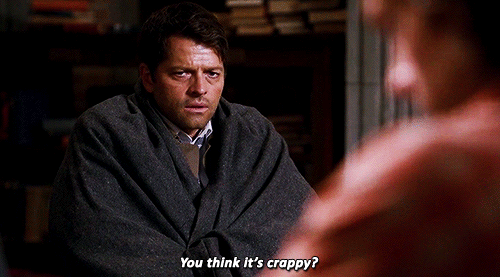
That new husband energy:

HES SO DAPPER HERE. All the heart eyes.
3.
Helpful husband moment
[EXTERIOR: DAY, OUTSIDE THE FARMHOUSE. THE IMPALA PULLS UP. CASTIEL IS LEANING AGAINST THE TRUCK. DEAN AND MARY EXIT THE IMPALA AND WALK UP TO CASTIEL.]
DEAN
Where's all this warding you mentioned?
CASTIEL
It's cloaked. It's very powerful. You brought your mother?
MARY
Hello, Castiel. Yes, he did.
DEAN
You sure there's anyone inside?
CASTIEL
No. The agent said the lease was handled long distance, but someone warded the house.
DEAN
I'm gonna go have a closer look.
[MARY STARTS TO FOLLOW DEAN.]
DEAN: Mom, I got this.
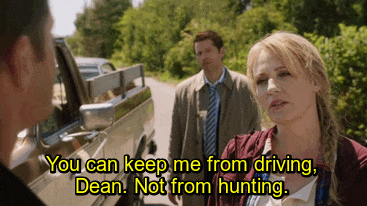
[DEAN SHAKES HIS HEAD IN ACKNOWLEDGEMENT THEN LOOKS TO CASTIEL FOR HELP.]


DEAN: Thanks.
[[DEAN LOOKS AT CASTIEL GRATEFULLY AND WALKS AWAY.]
***This entire scene deserves a thorough rewatch. Go watch it now. Bathe in the serotonin. I watched it probably 6 times. THE BODY LANGUAGE. THE FACIAL EXPRESSIONS. Cas saying “you brought your mother” because he KNOWS how worried and overprotective Dean is of her, already. This is Destiel peak supportive husband and Mary is realizing it and its just all so fucking cute and happy. Bravo to all of your Acting Choices!
4.
PIEEEEEEE






I will not go into my PhD dissertation about how pie is a metaphor for the true happiness and love Dean Winchester desires and DESERVES but feels like he cannot have because it will be snatched away from him.
I will not go into it at this time. (It will also make me even ANGRIER about what they DID TO PIE in 15x20. I am still healing).
I repeat, I will not go in to it - unless -

5.
Kitchen confidential
Look where Dean is relaxing, with a beer or 3, and looking at old family pictures at the end. It’s not his room.

It’s the kitchen. He’s just hanging out in the kitchen, comfortably as if he does this often.
Remember when Lucifer was possessing Cas in 11x18 and we had this scene, where Cas is in his head but in the Winchesters’ kitchen and - I wondered -

If his happy place
was
the Winchesters’ kitchen. And why.
THIS SHOW.


I guess the good in this episode took up more space than expected. I’m sorry for spamming you guys with this long, back to back Season 12 content, but I have a dossier.
And I’m just getting started.

BONUS:
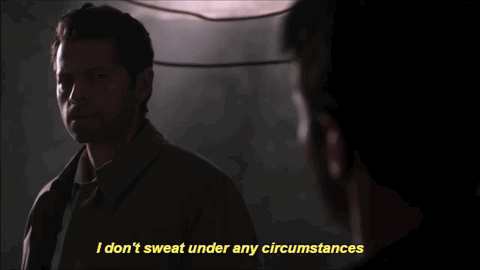
MICK
Here’s my number.
Also, picturing this, but in Casifer, said TO Rick Springfield.

#tbh this turned out longer than expected#maybe season 12 is actually the best season#I guess I should apologize for these treatises in advance#spn#destiel#spn family#spn fandom#supernatural#deancas#spn 12x02#Toni bevell#spn meta#spn recap#spn season 12#but seriously why rick springfield
116 notes
·
View notes
Text
To His Most Radiant of Lathander, Kelddath Ormlyr, Governor of Beregost
Your Excellency,
Please find enclosed with this letter extracts copied from my personal papers detailing the incident we discussed last month. Sincere apologies for the delay: I have found my papers to be in an odd state of disarray owing to an (unrelated) magical problem. This manuscript was created approximately three days after the incident described, during which time I had undertaken further investigations, the fruits of which are also recorded here. I assert, on oath as you instructed, that no material has been altered or omitted within its continuous length, making said length wholly your own fault. The absence of personal names is consistent with the original, a practice I have adopted in all similar papers as a defense against magical surveillance. No post facto alterations have been made. “The gnome” refers to that individual whose name I disclosed to you at our earlier meeting.
I hereby consent that you or your appointed representative inspect the original to confirm my sworn assertions above, with the stipulation that such an inspection take place within the walls of the High Hedge House, as we discussed earlier discussed.
***
The old conjurer is convinced that there are few things easier than for a wizard to go bad, and few things worse than a bad wizard. The gnome, unfortunately, is just the latest proof.
Upon reading this line, he is discomfited to discover that it sounds like the product of some Athkatlan zealot pamphleteer rather than a long practicing conjurer with some professional pride. As such, some clarifications are needed before he proceeds further.
There are “few things worse than a bad wizard” because wizards hold considerable power for making their plans and desires a reality, and so when those plans or desires turn toward the selfish, the callous, or the hateful, the scale of damage a wizard then creates is larger than the average creature. Powerful wizards can - and do - kill, enslave, and mutilate for no reason at all, or for no reason other than that they want to. Even the gnome’s peculiar penchant for petrification is not unique, although the power to do so is unique to wizards. But while the power to do certain kinds of damage is unique to us, it is not uniquely large: a bad king, or a bad merchant, or a bad priest can leave a trail of damage at least as long behind them.
Even when writing “there are few things easier than for a wizard to go bad,” it is not the old conjurer’s intention to assert that there is anything inherently corrupting about either the study or practice of the Art. Years of honing and exercising power - whether arcane or otherwise - simply make it fit comfortably in the hand, and may (not to say must) bring out the worst parts of a practitioner’s personality. Magic - or better, power - will not make a person bad, but it may make a bad person worse.
The gnome’s first letter arrived a little more than a year ago. He was a very pleasant correspondent: a fellow conjurer (unusual for one of his species) who was pursuing a research project, a project on which he had hoped for some assistance. He was interested in a refinement of the monster summoning spell which would allow for the conjuration of a specific type of creature - a greater basilisk. Both the specificity of the summoning and the power of the creature involved would represent significant advancements to the classic form of the monster summoning genre, making this a very exciting project indeed. To be invited to contribute to such an undertaking was extremely flattering.
What prompted the first letter (or so the gnome claimed at the time) was a treatise that the old conjurer had written many years before, dealing with the bound loyalty of summoned creatures. This is a topic about which most specialists show little interest, but which was especially interesting to the old conjurer due to its relevance to his old favorite question (creation vs. summoning). The gnome’s interest was more practical. Unless the loyalty of a summoned basilisk could be assured with the same level of certainty as for other objects of a monster summoning, the spell itself would be nearly suicidal to attempt. Flattered by the approach and (to tell the truth) lonely for professional conversation, the old conjurer was only too happy to reply.
And so the correspondence began. Every few weeks, a new letter would arrive, full of compliments for the old conjurer’s insights and with new questions, born (it would seem) from the gnome’s ongoing observations of the basilisk’s life cycle. It made for a pleasant diversion from the often mundane work of a magical shopkeeper, and reminded the old conjurer of his younger, more ambitious days.
Then, about a month ago, a letter of a different sort came. Still full of effusive praise, but this time with a request rather than a question. Could the old conjurer create an item - an amulet or a ring perhaps - incorporating some of the techniques they had discussed? Such an item would be an invaluable tool for studying basilisks in the wild, and potentially provide an essential proof of concept for the loyalty portion of the planned spell which, from the sound of it, was nearly complete. Excited by the prospect of contributing, even in a small way, to such a breakthrough, the old conjurer readily agreed, and set a date for the gnome to come to his stately house and collect the item in question.
The meeting - their first and only in the flesh - had started out quite cordially, though in hindsight there had been a number of danger signs even then that the old conjurer should have recognized. The gnome had been immoderately pleased with the ring, which he expected would serve only too well. When the old conjurer, who had planned a number of experiments to test the efficacy of the new and innovative enchantment, heard this, he expressed considerable surprise. How could the gnome be so certain? He smiled chillingly, and in a voice I will never forget, replied,
“Allow me to demonstrate.”
The gnome then began to cast. Based on the wording and structure, it was a gate spell of some sort, though modified and radically simplified, probably castable as a sixth-tier working. At the end of the incantation, the gnome spat out an object, probably the scale of a greater basilisk, given that that is what appeared in the middle of the old conjurer’s sitting room. Before he could recover from the shock of this, the gnome brandished his new ring and ordered the beast to turn the old conjurer to stone.
By happy accident, the old conjurer was prepared for such an attack. Expecting to see a controlled version of the proposed summoning spell in action, he had prepared a contingency spell that would protect him from petrification in the event that a basilisk or similar creature came within 60 feet of him. While the old conjurer had been caught unaware, the spell had not, and so he was protected from the attack even before it was ordered.
Unfortunately, he had lost valuable time, and the gnome at least had come prepared for a fight. Magical duels general follow a classic form. First, cast spells of defense, generally an illusion or a direct abjuration. By the time the old conjurer had gotten to his feet, the gnome was already mirror imaged. A low level defense, but a wise one on the whole. As a fellow conjurer, he knew only too well that his opponent had made no study of the sort of major divinations that provide the most direct countermeasure. He had also guessed rightly that I would be unwilling to destroy my own house with a fireball, and a mirror image provides more than adequate protection against more precise forms of offensive spell casting. It also frees up higher tier spells for offensive use.
But not quite yet. For, before moving on to physical harm, most mages will first make an attack on the minds of their opponents, a gambit that is both defensive and offensive, in that it undermines the ability to attack and defend simultaneously. Enchantment spells are the most common choice in such situations. The gnome had instead begun a spell which used heavily necromantic vocabulary. Horror, then: lower level and quicker to cast than most offensive enchantments, but correspondingly easier to resist. With a mirror image in place, successful disruption would be very unlikely, even if the old conjurer had prepared for a duel. He had not. He is a shopkeeper, and had been expecting a pleasant conversation with a colleague and then a normal day’s work.
But one must work with the materials to hand. Having been planning to finish brewing a stock of potion, the old conjurer had a spell of lesser invisibility prepared. Even with the gnome’s head start, he would be able to cast it on himself before the horror spell was complete. He did. Barely.
Luckily - or perhaps not; fear had been the old conjurer’s frequent companion for years - he was able to resist the spell. Even more luckily, his invisible state meant the gnome had no way of knowing that. This was not the sort of fight for which he had prepared. In all likelihood, the gnome had expected either to turn his host to stone at once or else to engage in a lengthy and intricate spell duel. Given the low level opening moves, he had probably reserved his higher level preparations (which would be at least sixth-tier, judging by the gate spell) for breaching spell defenses and dealing maximum punishment afterward. A game of cat and mouse with an old coward was not at all what he had been expecting.
He said as much, and more besides. That the old conjurer was an self-absorbed fool, so easy to flatter and manipulate. That he, the gnome, had only ever been interested in controlling basilisks and that the method had not concerned him. That he had already worked out the gate spell before writing for the first time, having been living for some time at a basilisk’s nest in the barrens east of town. That he had only ever wanted a control item, and had been feeding the old conjurer the information - and the simpering flattery - that he would need to complete it. He had discovered the treatise later and thought it would be the perfect way to start an acquaintance, and that the old conjurer would be the perfect mark. Real mages, after all, aren’t soft-skinned school boys interested in books and minutia. Real wizards seek to be as powerful as possible for as little effort as possible, so that they could do was they pleased. And that what pleased him was to take possession of this comfortable house and mount its previous owner on one of the turrets as a gargoyle.
How much of this is true, the old conjurer cannot be sure. He is a fool, certainly. No question of that.
But one does not live to be an old fool without learning a thing or two. He had known fear and danger, and he had known magical duels aplenty once upon a time. In that time, the old conjurer had discovered - like many greater wizards before and since - that winning such a contest has less to do with sheer power than many mages would like to think. At least as important, perhaps even more important, is timing. The most powerful mages can hurl swarms of fiery meteors capable of devastating whole towns. Such castings take time, however, and in the time that a great archmage is rattling off the necessary incantation, the greenest apprentice can shoot off a single magic missile, breaking his counterpart’s concentration and wasting the whole effort. And if that apprentice has brave friends with weapons, that may be the end of that.
As he crept invisibly around the sitting room, listening to the gnome rant and watching him pocket various valuable items, the old conjurer was trying to work out the timing. Presuming he did nothing more vigorous than creep, the invisibility spell would last a full day. He could try to escape and raise the alarm, but he was unwilling to leave the gnome alone in the house, with so many valuable and dangerous weapons with which to arm himself. (Truth be told, he was also unwilling to confess to others the depth of his ego and his blindness, an unwillingness he still feels). Perhaps he could simply leave the room, grab his staff and a few scrolls, then return to the fight on equal footing? But the gnome seemed to be thinking along similar lines, for he quickly ordered his pet monster to block one door, and was now busily looking for any others. As it happened, there weren’t any secret passages out of the room, a problem to which the old conjurer should tend soon.
So, it would come down to timing, If he simply waited, the mirror image would wear off in a matter of minutes, leaving the gnome vulnerable to attack. But any such attack would reveal his presence not only to the gnome but to the basilisk as well. How long the monster would remain was impossible to say. Summoning spells generally expire after about an hour, but this wasn’t a traditional summoning spell. How long could he afford to wait?
The gnome was getting more and more frustrated. He began to cast again, this time an enchantment. The old conjurer steeled himself, ready to fight off an intellectual or emotionally attack. But then he recognized the spell: the greater malison, designed to weaken his magical defenses. His impatient house guest wanted this over as quickly as possible, and intended to make it more likely that whatever dire or spectacular working he attempted next would be the last he would need. But what would he choose?
Creeping closer, the old conjurer watched as the gnome pulled from his pocket a single black pearl. As he crushed it to dust, the conjurer moved too. Picking up an empty potion bottle, he smashed it to shards against the table. The gnome, who had just begun the death spell incantation, flinched at the noise, and at his enemy’s sudden appearance within arms reach of him. He did not break his concentration, however. The conjurer began an incantation of his own: feeblemind. The spell was complex, though less so than the death spell. He should be able to complete it before the gnome could complete his. Then it would be down to whether the gnome would be able to resist. Seeming to realize this, he split into a mad grin. At the same moment, his mirror images flickered and went out, leaving only the real gnome, still mid spell.
And the old conjurer cast. But rather than casting at the gnome himself, he aimed his spell squarely at the ring on his finger.
The old conjurer is a shopkeeper, and he knows a thing or two about magic items. One thing he knows is that properly enchanted items remain receptive to magic for a certain amount of time after the completion of the spell. The ring was still within that receptive period, and by design. The old conjurer had not yet cast the spell that would make it’s basilisk-control powers permanent, wanting to be sure first that the experimental spell was effective. Instead, he added the feeblemind spell, because of something else he knows. When enchanting items, it is possible for the items to “resist” receiving the spell, much as a person might. An items ability to resist is always tied to the enchanter’s own magical resistance, resistance that the gnome himself had attacked. So, by targeting the ring rather than the gnome himself, the old conjurer had greatly diminished the ability of the gnome to resist the spell.
The fact that he sits here writing about it attests to his success. The feeblemind spell attached itself to the ring and badly damaged the mind of the casting gnome. His death spell died on his lips, though the look of shock and incredulity that he wore suggested that his mind was not so damaged as was usually the case. The basilisk, too, linked to the mind of its master, simply stood stupidly in the doorway of sitting room.
Knowing the importance of timing, the old conjurer set about removing his guests, both wanted and unwanted, as quickly as possible. Given the hasty construction of the gate spell - the old conjurer suspects that the gnome had opted for such a simple conjuration as a time saving measure - he surmised that a simple “dispel magic” would dispatch the basilisk back where it came from. Stuffing the basilisk scale back into the gnome’s gaping mouth, the old conjurer focused his dispelling on the creature. Both it, and its master, vanished without a trace, leaving the old conjurer with a bleeding hand (he’d needed the glass for his spell), a wrecked sitting room, and a sick, empty feeling.
In the time since he has tended his hand with bandages and the feeling with research (the room will have to wait until his hand is better). This is what the old conjurer has discovered so far. The “summoning” spell the gnome created was in fact a modified gate spell. He was able to cast it at the sixth tier rather than the usual ninth because of his deep knowledge of basilisks and, more importantly, because he had hidden the basilisk nearby, in a small cove on the coast. The sirines had told him that they had seen a gnome matching his guest’s description anchoring a ship there for the last several weeks, most recently unloading a large crate. Disturbingly, it was one of several. The rest were not onboard when the ship returned for its addled master a few days later. His mind was apparently intact enough for him to operate the ship, though not successfully. It wrecked a few miles to the south. The whereabouts of the gnome himself are at this time unknown, but inquiries continue. Hopefully, his mind is now too damaged to perform further magic, or at least magic at the level he once practiced. It would be foolish to take too much for granted, however. And to judge by his horrific actions so far, a diseased mind did not stop him from being a mage before I intervened, so there is no reason to expect that it will be so now.
It is far too easy for a wizard to go bad, whether out callous greed or ego and loneliness. A lesson learned.
***
Well, that’s the worst of it. I suspect he’s hiding somewhere northeast of town, but it would probably be best to wait for him to come to us rather than place a bounty on his head. If he remains in possession of his powers and his monsters, he will be a more formidable foe than most around here can manage, and if we are to fight him ourselves, I would prefer to have the advantage of defense. But then, perhaps I am a coward after all.
-T
#an old conjurer's memoirs#bg1#baldur's gate#wizard#mage#this took forever#and i cut so much#and it's still so long#ugh
6 notes
·
View notes
Text
Unpacking my summer’s readings
So I’ve finally gotten to munch through a hefty chunk of my reading list this summer break, which to this day is still outpacing my ability to keep up. Nevertheless, I’m pretty happy to report that the couple books I did manage to finish were full of gems and precious little nuggets of insight. The list goes as follows (in chronological order of completion, more or less)
The Accidental Universe by Alan Lightman
Antifragile by Nassim Nicholas Taleb
Behave by Robert Sapolsky
Homo Deus by Yuval Noah Harari
Barking up the Wrong Tree by Eric Barker
Give and Take by Adam Grant
Anti-Intellectualism in American Life by Richard Hofstadter
Thinking Fast and Slow by Daniel Kahneman
3, 2, 1… Unpack!
1.
The Accidental Universe
by Alan Lightman
“In our constant search for meaning in this baffling and temporary existence, trapped as we are within our three pounds of neurons, it is sometimes hard to tell what is real. We often invent what isn’t there. Or ignore what is. We try to impose order, both in our minds and in our conceptions of external reality. We try to connect. We try to find truth. We dream and we hope. And underneath all of these strivings, we are haunted by the suspicion that what we see and understand of the world is only a tiny piece of the whole.”
— Alan Lightman
I’ve got to say, Lightman has a way with his words. In this essay, he weaves together descriptions about our vast and chaotic universe that just ooze with inspiring, tear-jerking beauty. His one segment about humankind’s yearning for permanence in this universe, that is notoriously unkind to that very notion, is so poignantly crafted that it’s worth a couple rereads. As a physicist, Lightman took his sweet time describing the universe at the enormous, cosmic level. At parts, he reached levels of abstraction where you were being fire-hosed with talk about thermodynamic laws, God(s), probability, miracles, and all other things that straddle divinity and science. This was great food for thought, for sure, but all this universe talk seemed to me like a bad recipe for nihilism. Human existence, in the grand scheme of things, really is woefully insignificant, especially if you’re zoomed out all the way in god-land like that. So I guess this book wasn’t the best at making me feel as though my mundane struggles, wants, and life ambitions had any real meaning or importance (which do, I protest!). Did this book fill me with wonder and intellectual bliss? Yep! Did this book kindle the fire in me to grease up my elbows and roll up my sleeves and make a difference in this world of humans? Sadly, no.
2.
Antifragile
by Nassim Nicholas Taleb
“Somehow, it is only when you don’t care about your reputation that you tend to have a good one.”
— Nassim Nicholas Taleb
Hohoho what a refreshing read this was! How should I describe this book… a bold treatise that exposes everything wrong with the world’s approach to risk and randomness through the lens of an anti-intellectual scholar? Taleb has no tolerance for bullshit, is irreverently skeptical, and is ruthlessly blunt about his dislike for pretentious armchair intellectuals and “fragilista” professionals. What impresses me the most about AntiFragile is that it is one of those few reads that actually have a real influence on my actions and thought processes. His arguments about randomness and risk (maximize optionality, gauge fragility instead of trying to predict the future, embrace variability over fragile stability, etc.) have pretty concrete applications if you really internalize what he says. No other book motivates me as much as this one to explore my opportunities widely and boldly. He never explicitly says this in the book, but the sentiment I really took away was: Carpe Diem! (Oh, and also a little bit of ‘Fuck You’)
This is not to say that I instantly agreed with everything he said. In fact, I admit that I found quite a few of his concepts to be difficult pills to swallow, at first. For instance, he argues that we can tame the randomness in our lives by having optionality, as it can help us bound our losses and unbound our gains. Basically, you’ll always have the upper hand if you diversify your options, enter situations while maintaining multiple exit strategies and backup plans, and generally refuse all eggs-in-one-basket commitments (because that’s what fragile suckers do). I admit, my initial reaction to this was of mild disgust. Here’s a snippet from a sour journal entry I wrote, which I quote: “Taleb wrote an entire book about how not to be a sucker. Instead, he teaches you how to be something else: an asshole!” In slightly less emotional terms, what I meant here was that this flighty strategy would work great for self-preservation, but seems damagingly reckless to the big things in life that do inevitably require vulnerability and self-sacrifice, like close relationships. I think Taleb provides fantastic practical advice for how to withstand and thrive from turbulent challenges, but he would be missing the mark if he pushes self-preservation as the highest priority for living a good life. These insights, that have served him well as a former trader on Wall Street, just might not produce the same smashing successes when applied everywhere in life, I reckon. So while he has certainly demonstrated the wide applicability of his ideas, I yearn a bit for a more conscientious exploration of its limits.
3.
Behave
by Robert Sapolsky
“You don’t have to choose between being scientific, and being compassionate.”
— Robert Sapolsky
Ok this book takes the cake as my #1 favorite book of this summer. It also deserves another superlative: #1 Most philosophically provocative book.
Here were my first thoughts:
Robert Sapolsky?! The Sapolsky guy who did that brilliant talk at Stanford that inspired my starry-eyed self from middle school? YEA OH YEA IT’S HIM
Oh dear. Very big book.
If you were to go to Mars and could take only one social science book with you on your journey, bring this behemoth. A book with the ambitious goal of exploring all the best and worst parts of humanity, Sapolsky has meticulously combed through and weaved together a comprehensive quilt of all the landmark studies and events that have shaped science’s understanding of human nature to date. He patches together the motivations and meanings of our actions by blending ideas from a spectrum of disciplines including evolutionary biology, biochemistry, genetics, neuroscience, psychology, sociology, philosophy, game theory, law, and economics . Something I admire a lot about this book is the amount of nuance and humility Sapolsky has when explaining human behavior. No matter what arrogant “experts” confidently assert about their fields, one can’t adequately account for all the subtleties of human nature by relying on any singular model. I guess that sounds like common sense, but I think the inquisitive softness that I have come to appreciate in Sapolsky’s writing isn’t something very common at all.
That being said, I do have to say this book had a slow start for me. Sapolsky probably intended for his narrative to be as accessible to the general public as possible, so he took his liberties in the early chapters to explain the fundamental biology and neurochemistry concepts underlying his book. Not to say that this stuff isn’t interesting, but it was a little dry. Anyone who has taken a formal psychology class before or is a seasoned reader of social science books probably isn’t a stranger to many of the famous experiments he discusses in detail. Not to worry, though. The pace eventually picks up, landing its best kernels of wisdom and greatness toward the end. And seriously… it is worth the journey. I finished chapters 15-17 feeling like a champion, having experienced feelings towards humanity that swept across my whole spectrum of emotions (a book can do that?). I’ll do you the courtesy of not spoiling any of it ;)
So why do I find this book to be the “most philosophically provocative?” ‘Behave’ obviously invites a lot of introspection about human nature, but I think the doozy in this book lies in the recurring dialogue about free will vs. determinism. I know — bear with me — this debate has probably been beaten to death within academic circles for a century. But Sapolsky brought a new sense of urgency to the question by noting the relentless advancements of scientific and technological discovery we’ve been seeing in recent years. Sapolsky himself sits in the deterministic camp of ideology (gasp!), and goes into pretty grave detail about what this implies. If what he says is true, that humankind is already headed in the direction of realizing there is no free will, our current legal system and humanistic societal mores will be needing some serious revisions. But hey — the hopeful future he paints, where we will have shed our primitive beliefs in “evil” agents and learn to harmonize science with compassion sounds pretty swell to me. *shrugs*
(Bonus quote, because I loved this book so much)
“Solving those nuts and bolts issues may be a way of ending the war, But peace is not the mere absence of war; making true peace requires acknowledging and respecting the sacred values of them. /…/ In rational choice models of decision making, something as intangible as an apology could not stand in the way of peace, yet they do. Because in recognizing the enemy’s sacred symbols, you are de facto recognizing their humanity, their capacity for pride, unity, and connection to their past, and most of all, their capacity for experiencing pain.”
— Robert Sapolsky, Chapter 15
4.
Homo Deus
by Yuval Noah Harari
“This is the primary commandment humanism has given us: create meaning for a meaningless world. Accordingly, the central religious revolution of modernity was not losing faith in God, but rather gaining faith in humanity.”
— Yuval Noah Harari, Chapter 9
Ok, I admit: After Sapolsky’s grand finish in “Behave”, diving straight into a second let’s-walk-you-through-all-of-human-history book without a proper palette cleanser wasn’t the most tasteful choice. But let’s leave that behind us, shall we? What “Homo Deus” has in common with “Behave” was an iffy beginning, though for a different reason. Harari starts the book off by painting some crazy speculations about humanity’s future and excitedly exploring the moral quandaries that come along with them: we unlock immortality, “hack” away society’s current afflictions, and/or upgrade ourselves to be living gods (hence the dramatic title). To be honest, all of that optimistic sci-fi talk started to annoy me, and I came close to abandoning the book; if there was anything I learned from Nassim Taleb, it was to protect my eyes from the cancerous garbage spewed by haughty experts who think they can predict the future. Thankfully, Harari was aware of this, as he was quick to qualify himself, before he began his thorough survey of man’s historical timeline, starting from square one. That was where the real fun began.
What stood out to me about this book was not its recounting of specific historical events in detail, but rather its insightful high-level analyses of human progress. I LOVE it. Somehow, Harari was able to capture the zeitgeist (pardon the fancy word) of every great human era, into one flowing narrative.
Here’s one example so you know what I mean. Harari remarks at one point that “modernity is a deal,” in which we have traded meaning for power. Long ago, when humans were pretty powerless against nature and celestial deities were the go-to answer for all the big questions about the universe, people didn’t struggle with existential crises. But in the modern age, where science and technology equip people with more power to direct their lives than ever before, meaninglessness and existential unease strikes like the plague. Cool, right? “Homo Deus” is FULL of insights like this. It’s incredible.
5.
Barking up the Wrong Tree
by Eric Barker
“We often confuse fate and destiny for meaning the same thing. But UCLA professor Howard Suber clarifies the distinction: fate is that thing we cannot avoid; it comes for us despite how we try to run from it. Destiny, on the other hand, is that thing we must chase — what we must bring to fruition. It’s what we strive toward and make true. When bad things happen, the idea of fate makes us feel better. Whereas /…/ success doesn’t come from shrugging off the bad as unchangeable and saying things are already meant to be. It’s the result of chasing the good and writing our own future. Less fate, more destiny.” — Eric Barker
Of all the books listed, this one was definitely the breeziest and perhaps the most enjoyable book to read. It is a fast and lightweight read, with an addicting quality to it that reminds me of online blogs (like Medium!). Addicting, you might ask? Yeah — the chapter titles are written like Buzzfeed article headings ( I mean this endearingly) , just beckoning for you to continue. For example, here’s one: “Do Nice Guys Finish Last?” … Need I say more?
I don’t have much else to say about this book besides how easily digestible and pleasurable it is to read. But don’t get the wrong idea — It’s full of hearty insights, and I love how Barker can explore some very deeply philosophical questions in plain speak, without dishing out empty, glib answers. It’s an espresso shot of no-frills discourse and practical wisdom about our common misconceptions about success. Who doesn’t like to ponder about how to live a successful and meaningful life? What is success, anyway? Bring it with you on your next plane ride or listen to its audiobook version during some thoughtful walks. 10/10 would recommend.
6.
Give and Take
by Adam Grant
“Givers don’t burn out when they devote too much time and energy to giving. They burn out when they’re working with people in need but are unable to help effectively.”
— Adam Grant
Nice guys don’t finish last. There, I said it. Adam Grant says so too. And then he wrote an entire book about it.
This book has the lively cadence that reminds me a lot of Malcom Gladwell’s books. Solid, real-world examples and anecdotes make Grant’s book lucid and persuasive. Reading ‘Give and Take’ gave me the fuzzies at parts, because who doesn’t want to feel that all is right with the world, where happy endings occur to people who give generously? But, of course, anyone who hasn’t been living blissfully under a rock their whole lives knows that this isn’t always the case. The kicker in this book is not that he praises saintly and self-sacrificing behavior (which, he does admit, can turn people into burnt-out doormats), but the way he distinguishes selfless and “other-ish” giving. Effectively, he discusses what styles of giving are actually sustainable and win-win in the long run, while giving practical advice about how not to be a burnt-out doormat. Valuable stuff to read, especially if you self-identify as a giver and want to feel validated. Grant reminds us that we (impersonal ‘we’) can help others and help ourselves too, if the cards are played right. I think I give this book a 7.5/10… solid book with clear arguments, but nothing about it made me leap out of my chair.
7.
Anti-Intellectualism in American Life
by Richard Hofstadter
“ The professional man lives off ideas, not for them. He’s a mental technician”
— Richard Hofstadter
I’ve got to say that this book was most unlike the others I’ve read. If you’re a U.S. history buff, you’d really enjoy this book, which deep-dives into the ebbing and flowing tides of American anti-intellectualism since its origins in the Great Awakening of the 1700’s, all the way to the present day.
( Heads up: This next bit is more of a rant than a book review.) The most mind-blowing thing I learned was really how deeply ingrained anti-intellectualism is in American culture. Peering into the darker parts of the U.S.’s recent history (remember McCarthyism?), the book highlights that intellectuals in this country have long been stamped with disparaging stigmas of being untrustworthy, morally decadent, effeminate, and, get this, un-American. Maybe it’s because I was raised in a different culture, but those sentiments just seemed bizarre to me as I was reading about them, and it took me a long time to understand. Personally, I’ve always revered the well-educated for their critical reasoning skills and genteel dignity, and could never wrap my head around why respectable Americans would routinely seem to be captivated, instead, by crass populist figures. How did “hardworking and charming Christian with simple and practical-minded values” become popularly known as the traits of the “quintessential” American man? This book walked me through the ins and outs of anti-intellectualism, which has become so integral in this country’s narrative. Here’s a thought: have you wondered why the U.S. isn’t known for having beautiful relics or extravagant monuments of classical art and culture, like many Western European countries are? Maybe it’s because the U.S. was built by founders who wanted nothing to do with all that . The first settlers had fled from such countries, and have abandoned centuries of history and tradition and culture, to live a simpler and more pious life. From this, you could probably imagine how anti-intellectualism begins to fit into the picture of American history. These roots run deep.
As much as I don’t want to bring up the 2016 election and subsequent events, this book, though it was published in 1963, is pretty darn relevant to all the craziness that we’re facing today ( is it a little disturbing that things haven’t changed that much in a half-century?) Last year’s presidential election was insane; it tore open old scars, and revealed an ideological rift between Americans that at times is so hostile that it seems impossible to get both sides to understand each other. I won’t say that this book magically made me “understand” all of the unrest between the left and right, or convinced me that anti-intellectualism is a great thing (still disagree…). But it definitely got me thinking about how swampy and complex this makes American history.
All that being said, Anti-Intellectualism in American Life was a fascinating but pretty challenging read. I’m no U.S. History enthusiast, and I certainly won’t be able to remember all the names, dates, and events that were mentioned, but it was enough to get me thinking about America’s past, the evolution of its values, and the perspectives of the “American people” of whom people like to refer.
8.
Thinking Fast and Slow
by Daniel Kahneman
“ Experts who acknowledge the full extent of their ignorance may expect to be replaced by more confident competitors, who are better able to gain the trust of clients. An unbiased appreciation of uncertainty is a cornerstone of rationality — but it is not what people and organizations want. Extreme uncertainty is paralyzing under dangerous circumstances, and the admission that one is merely guessing is especially unacceptable when the stakes are high. Acting on pretended knowledge is often the preferred solution.”
— Daniel Kahneman, Chapter 24
When shopping on Amazon for this book, I’ve honestly read nothing but praise. Kahneman and Tversky’s work have had an earth-shattering influence in the social sciences and economics for the past few decades, and it goes without saying that this book is a staple for anyone remotely interested in behavioral economics. All I can really think of to say is to read this book carefully, and have a pen on hand to annotate. This book is DENSE with counterintuitive insights about human psychology, which will make any reader start to think twice about the reliability (or unreliability, rather) of his/her judgment. Very cool, all the way through.
…
Unpacking: Done
So, there’s that: my compendium of book commentaries of the summer. I am ALWAYS looking for more thought provoking things to read, so please (x3) feel welcome to send me book/article/blog recommendations. Thoughtful discussions always appreciated :)
0 notes